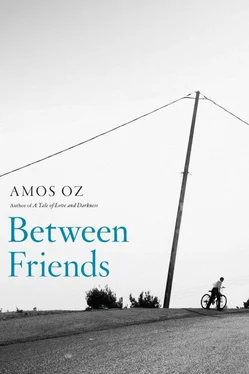“I like him, too, but I’m not sure I want to talk to him about this. I think I’ll embarrass him too much. It’s better if you speak to him. Have you noticed that he has no friends?”
Yoav said, “On the kibbutz, it’s hard to know. We’re all supposed to be friends, but only very few really are. Take me, for example. I only have two or three personal friends, people I enjoy being with even if we don’t talk. I don’t think you have more than that either.” He had a strong urge to tell her that what they, he and Nina, had together was close to what he considered friendship, but he hesitated, then decided not to say it.
“In ten or twenty years,” Nina said, “the kibbutz will be a much more relaxed place. Now, all the springs are tightly coiled and the entire machine is still shaking from the strain. The old-timers are actually religious people who left their old religion for a new one that’s just as full of sins and transgressions, prohibitions and strict rules. They haven’t stopped being true believers; they’ve simply exchanged one belief system for another. Marx is their Talmud. The general meeting is the synagogue and David Dagan is their rabbi. I can easily picture some of the men here with beards and sidelocks, and some of the women in head coverings. But slowly, times will change and other, more relaxed people will come, and like you, Yoav, they’ll be people with patience and doubts and compassion.”
“You’re completely wrong about me, Nina. I also have principles that I try not to deviate from. I also think that the kibbutz can’t exist without a framework and rules and basic principles. Veterinary medicine, maybe, yes, it’s an idea. And it suits Yotam much more than mechanical engineering. Yes. Maybe. But not now. In two years, when it’s his turn to go to college. That, I might be able to push through at the meeting Saturday night. Not mechanical engineering and not now, but veterinary medicine in another two years.”
“One?”
“It’ll be difficult. There’ll be a big battle at the meeting. David Dagan will sound off. The old-timers will object on principle to taking money from the uncle — they despise Arthur — and the young people will probably be split on the vote. It’ll be difficult and complicated, Nina.”
On Saturday morning, the day the kibbutz general meeting was scheduled to discuss and vote on the matter of Yotam’s attending college in Italy, David Dagan went to Yotam Kalisch’s room. Yotam, who’d slept late, was still in bed clad in only underpants and undershirt, and his large hands pulled the sheet over the lower half of his body to hide his morning erection. David was wearing sharply creased khaki trousers and a light-blue short-sleeved shirt with a battery of three pens sticking out of the breast pocket. He had very straight, almost military, posture and his shoulders were strong and square. His full head of graying hair was tousled just enough to look dashing but not completely unkempt. David, who’d been Yotam’s teacher a few years earlier, gave him an offhand hello and sat down on the edge of the rumpled bed. Yotam hesitated and, moving awkwardly under his sheet, pulled on the work trousers he picked up from the floor, then leaned over and turned on the electric fan. David scrutinized him until he was finished and had sat up, then gestured for him to take a seat on one of the wicker stools. Yotam obediently moved over to the stool.
“I’m worried,” David began without preamble, “about Henia. She’s taking all this very hard. You’ve put your mother in a difficult position with our members.”
Yotam was silent and stared at the window.
“And just when I’ve been hearing that you’re doing such an outstanding job in the orchards.”
Yotam remained silent.
“Do you want to be a mechanical engineer?”
“Not exactly, but… ”
“But you feel suffocated here and the big world is so alluring,” David said without a question mark at the end of his sentence. “You’ll be surprised to hear that I also find the big world alluring. I’d love to see Rome, Florence, Venice, Naples.”
Yotam shrugged. David put a hand on his knee and said quietly, “But every Jew of the generation that witnessed the Holocaust, and especially now, so soon after the rebirth of the State of Israel, must see himself as mobilized to a cause. These are the most critical years in the entire history of the Jewish people.”
Yotam said, “The thing is I can’t take it anymore. I have no air.”
David looked at Yotam with affection and curiosity. Then he said, “All right. Go.” And added, “Just give me a minute to set things straight. At tonight’s meeting, I’ll recommend that the kibbutz grant you two or three weeks off out of consideration for your personal crisis. Go to Italy. See your uncle. Breathe some new air. Then return to us with renewed energy and go back to your job in the orchards.”
Yotam tried to say something, but David Dagan placed a fatherly hand on his shoulder and interrupted him, “Please, think it over. Think it over till tonight.” And as he was leaving, he said, “Don’t force the kibbutz to slam the door in your face tonight, Yotam, and especially not in Henia’s face. Think calmly about my offer. Please decide by tonight.”
At two in the afternoon, when the oppressive heat had crushed the life out of everything and the low sky was a polluted gray color, Yotam left his room and walked down the paved path through Housing Area 3, past the cow barns and the chicken coops. There was no one outside because they were all having their Saturday afternoon rest. Not a single living soul saw him except for a thirsty dog, and Yotam stopped for a moment to turn on the garden tap for it. The dog lapped up the water noisily, its head and snout getting wet in the flow. Then it shook itself, spraying water in every direction, panted, wagged its tail rapidly, and knelt down on its front legs as if prostrating itself in front of Yotam. He petted the animal distractedly, then continued walking across the heat-choked lawns and among trees that looked inanimate because no wind touched them.
Passing Nina Sirota’s apartment, he quickened his steps, hoping she wouldn’t happen to emerge just then, wishing at the same time that the door would open and she’d come out and talk to him about Italy and perhaps understand him. Even though he really had no idea what he could say to her. The entire kibbutz was talking about his request to be sent to Italy, and that night, he’d stand in front of everyone and the secretary would give him the floor and three hundred pairs of eyes would glare at him, and he still had no idea what he could say. And if Nina came out of her apartment this very moment? What could he say to her?
Piles of slop lay between the cow barns, and old tires and bits of scrap metal were scattered on the ground along with a few discarded, rusty milking pails. Yellowing bits of newspaper were trapped among the nettles and bindweed that grew between the barns. Yotam crossed the area of the barns and coops and went out to the fields through the back gate, known on the kibbutz as the Dung Gate. The path soon led to a plowed field on the right and a vineyard on the left, both swathed in dust because of the intense, dry heat. Very quickly Yotam felt the dust slip beneath his clothes and stick to his sweaty skin. Not a single breath of wind stirred the congealed air. He lingered at the cemetery, thinking for a moment that he might visit the grave of his father, who had died of kidney disease when Yotam was eleven, but then he decided to sit on the bench at the cemetery gate for five minutes. He thought about his father, one of the kibbutz founders, who had spent his life working in the sheep pen. He’d been seriously injured in the War of Independence on the night Kibbutz Yekhat was invaded and burned to the ground by an Arab mob from Deir Ajloun and the nearby villages. Six weeks later, the tables were turned and Deir Ajloun was destroyed by the Israeli army, all the inhabitants driven off to the mountains and their fields divided among the kibbutzim in the area. Then Yotam thought about Arthur, who’d dared to disobey the general meeting, had cut off all contact with the kibbutz and the country, and refused to serve the cause when the war was over. He’d built the life that he, and only he, had wanted. I can get up and go too and build the life I want. David Dagan said that in this generation, the generation of the Holocaust and Israel’s War of Independence, each of us must be mobilized to the cause. Yotam could find no argument against that claim. But suddenly the phrase “his days are as grass” came into his head and made him think how fleeting life is.
Читать дальше












